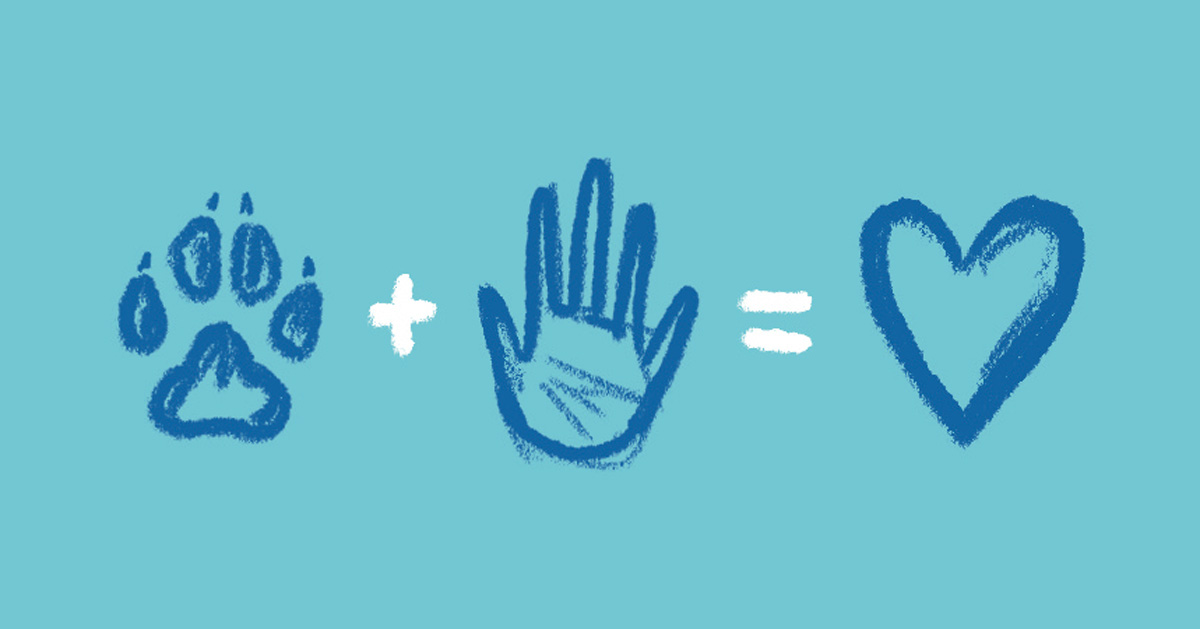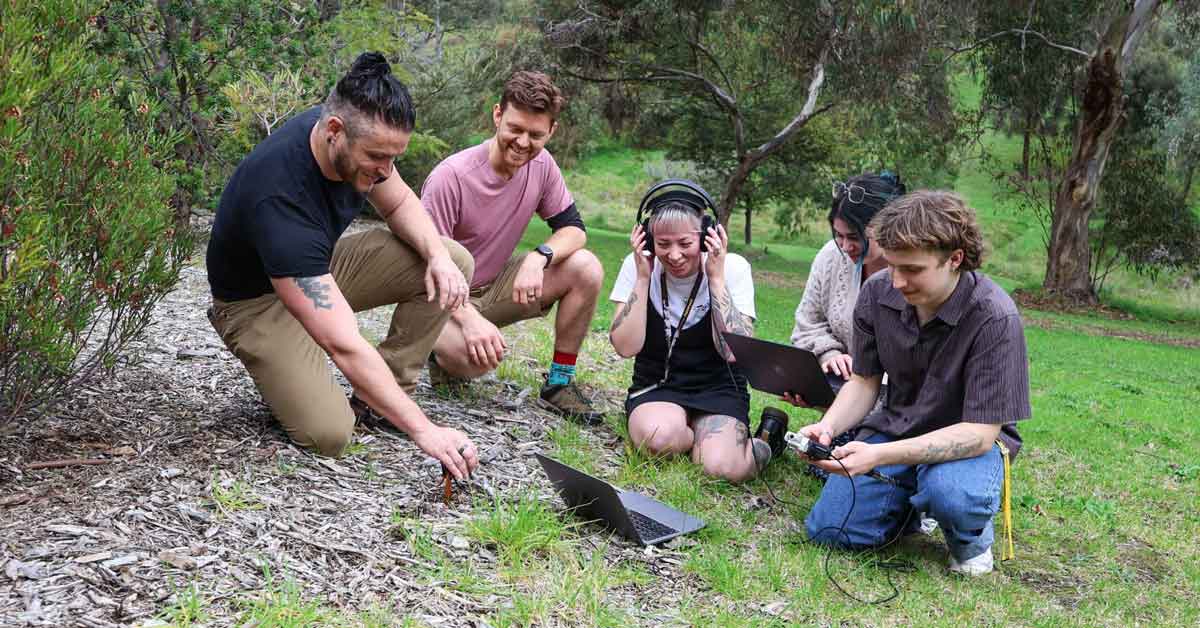As more and more people see their dogs as quintessential members of the family, their care is incorporated into a dog owner’s “cost of living.” But in the United States, everyday people face a cost-of-living crisis.
Therefore, so do their pets.
Along with rent and grocery costs, the price of pet care has risen dramatically in recent years. A Bank of America Institute report found that since 2019, prices of services like veterinary care and grooming have gone up 42%, with the cost of goods like food and treats surging 22%.
These barriers are leading to an influx of people surrendering their pets to shelters.
“The main reason for pet surrender is, ‘I can’t afford it.’ Vet care is expensive, food is expensive, I mean, just human cost of living is expensive,” Risa Weinstock, the CEO of Animal Care Centers of New York City, told NBC News in July 2025.
While shelters call on people to adopt, they also understand that there are barriers associated with pet care, and they don’t want to create a cyclical problem where animals continue to return to shelters. Fostering has become a way to bridge the gap in the interim.
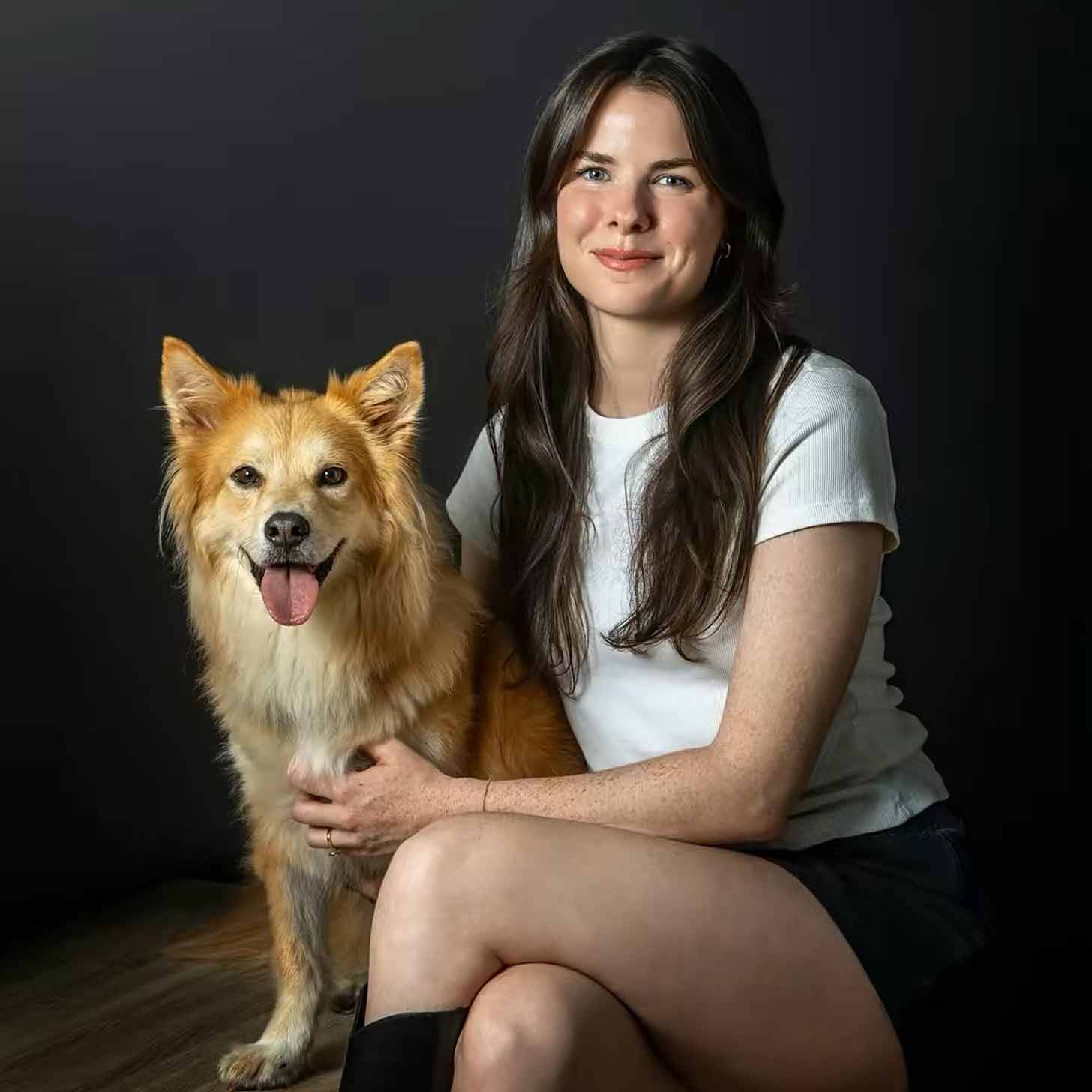
Isabel Klee, famously known under her Instagram and TikTok moniker @simonsits, has been fostering dogs for years — 25 of them — alongside her permanent pup, Simon.
“You can’t have animal welfare without human welfare,” Klee said in a recent podcast episode of “The Dogs Were Good Again.”
“There are so many rescue people who say things like ‘I hate people; that’s why I work with dogs,’ and I do understand,” she went on.
“In the rescue world, you see the worst of the worst, but you also just see a lot of people who have no other options … I think people are inherently good, and I think it’s important to give them the benefit of the doubt. I’ve had so many fosters that were owner-surrenders, and so many people say … ‘I would never abandon my dog.’ Like, you should feel glad that you’ve never had to.”
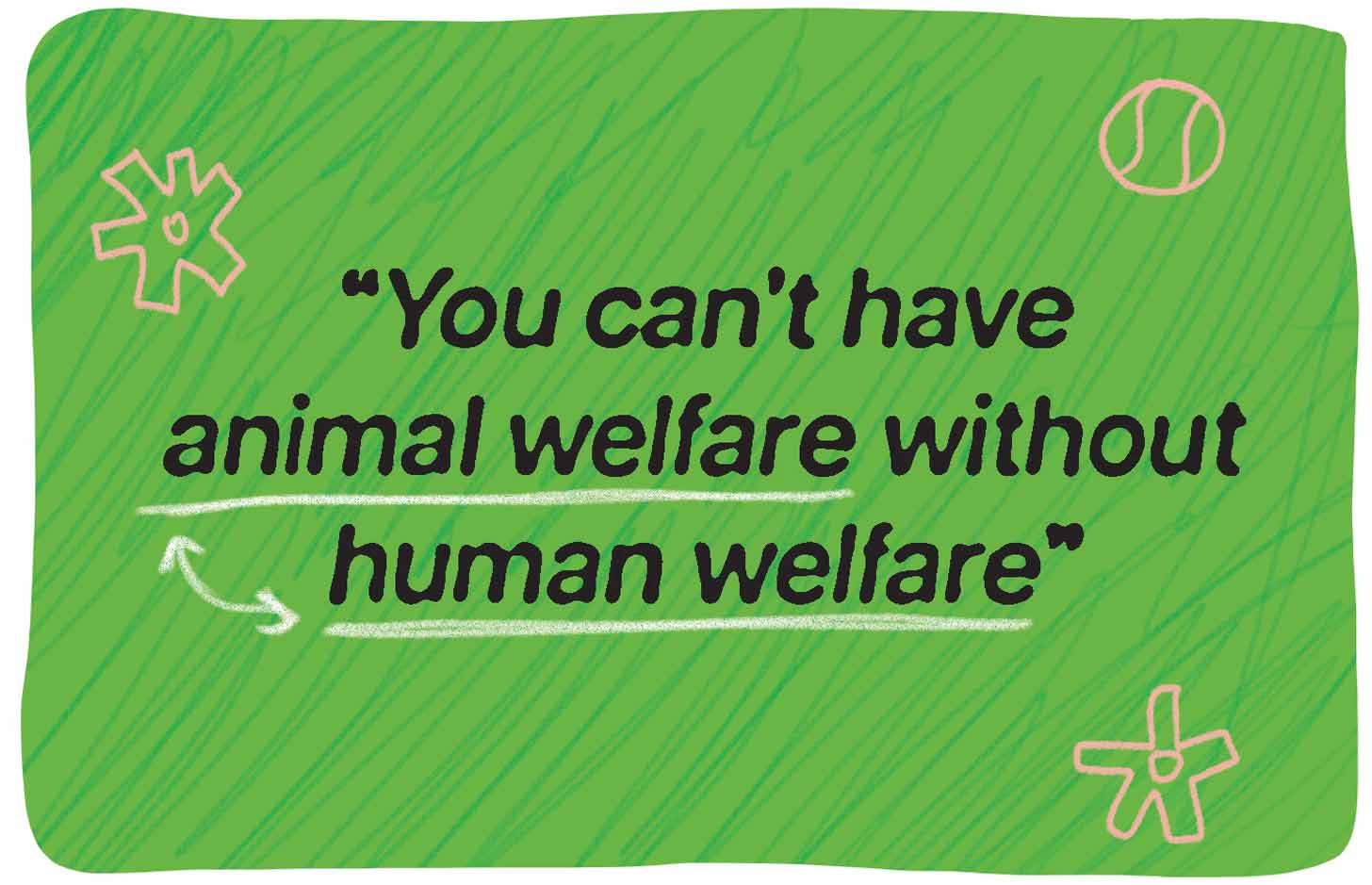
For some people, surrendering their pet simply isn’t an option — they would rather give up everything else first. It’s something Dr. Kwane Stewart has seen firsthand in the last decade as he has built his nonprofit Project Street Vet.
A veterinarian for nearly 30 years, Stewart spent the majority of his early career as a shelter vet during the recession. At a shelter with high intake and high euthanasia rates in California’s Central Valley, he was facing immense burnout and compassion fatigue.
One night, as he was leaving work, he came across a homeless man and his dog outside of a 7-Eleven. The dog was clearly suffering from a flea condition.

Stewart introduced himself and offered to help the dog for free. When he saw the same dog about a week later, she was transformed.
“The man was just so grateful and started to cry, saying ‘Thank you for not ignoring me, for stepping over and offering to help,’” Stewart recalled to Good Good Good.
It was a turning point. At first, it was just Stewart and his backpack with basic medical supplies and medications, treating dogs on the streets of Skid Row in Los Angeles. Eventually, he officially created Project Street Vet, which now has chapters across the country where volunteer vets help treat the pets of homeless folks in need.
Stewart said free vet clinics are certainly helpful, but walking the streets is where he meets most of his clientele.

Most dogs just need essential care for skin issues, allergies, and basic wellness, like flea and tick medications, heartworm prevention, and regular vaccines. Any other major procedures are referred out to partner providers.
For as much good as he’s done over the years, it wasn’t always easy for Stewart to have this approach.
“You come out of vet school taught to really understand that when you acquire a pet, you're taking on full responsibility for that pet. You should be in a position to give care to that pet, and it’s not just love and companionship, but medical care, resources, food. But I think when you get in this game long enough, you realize, that doesn't always play,” he said.
“There are people who fall on hard times and rely on their pets in ways that maybe the rest of us take for granted. It's a lifeline for some people. We, as an industry, have to step up, find ways to be creative, and help out.”
After spending so much time with unhoused clients, he has learned to remove shame and judgment from any aspect of his work. In fact, the organization’s mantra is “No judgment, just help.”

“[Our clients] are by far better than the average pet parent, me included, when it comes to loyalty to their pets and companionship,” Stewart said.
“When I hear these stories in the streets about people sacrificing their meal for the day to feed their pet, or when their golden ticket is finally pulled and they get housing offered, but they refuse if it does not accept their dog … you can’t criticize that. They get it right in a way that most of us do not.”
The care Stewart and his team give to these animals isn’t just out of the kindness of their hearts; it is also a strategy to help vulnerable people find a way out of their circumstances.
“I've seen it play out time and time again, where the absence of their dog leads them to fall back into their addiction, or they lose hope to continue. Some have fallen to suicide when they've lost their pet,” he said.

He told the story of a woman who invited him into her tent after he heard a dog whining inside. He treated the dog with some basic care and vaccines, and as he did, she told him that just a few weeks prior, she had decided to take her own life.
“By her own admission, she said, ‘I’ve been an addict for 10 years. I cannot kick it. I’ve lost the support of friends and family, and I don’t really have anyone in my life but [my dog],’” Stewart recalled.
“She got a pocket full of pills and a bottle of liquor, and she said she was holding the pills, and right before she took them, she looked over at her dog curled up in bed, and had one thought: ‘If I take my life tonight, who’s going to feed you in the morning?’”
The thought alone stopped her in her tracks, and the next day she went back to rehab.
Stewart saw the woman again about six months later, and for the first time in a decade, she was still sober, now applying for jobs and housing.
Her dog’s health and safety were a gateway to her own.
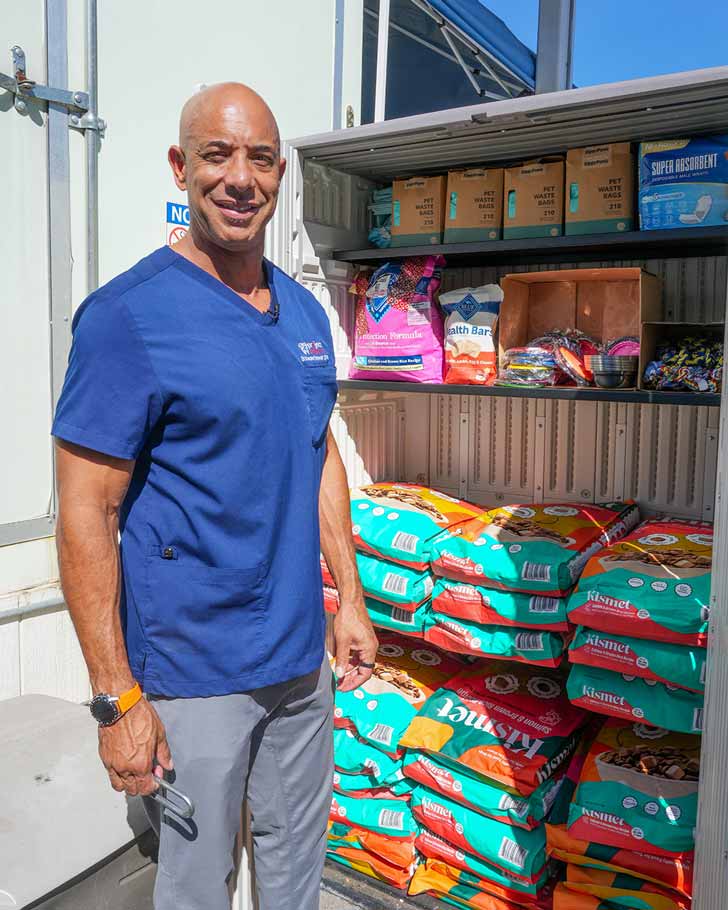
Stewart’s work is urgent and meets people directly where they are, but he admits it can be a band-aid to much larger, systemic inequalities. In Southern California, he said, policies are changing to make homeless shelters more accommodating to dog owners.
Also in Los Angeles, he said, the shelter system is adopting a measure whereby if someone is attempting to surrender their dog to a shelter for medical reasons, they are first given a line of credit to receive care at a participating veterinarian.
“Dropping your dog off at the shelter, it’s almost like a jail system for people,” Stewart explained. “The shelter incurs more costs when they take in the dog, versus just allowing the person some credit or some money to treat the dog and stay with them.”
On a federal level, Colorado representative Jason Crow has introduced a bill to Congress called the Providing for Unhoused People and Pets Act of 2025 (PUPP Act), which would provide funding for homeless shelters to retrofit their facilities to better accommodate pets, so that people don’t have to choose between having a roof over their head and staying with their pet.
Regardless of the progress, Stewart said, high costs remain prohibitive for all dog parents, even those who are not facing homelessness, and the data backs that up.
Earlier this year, a survey conducted by PetSmart Charities and Gallup found that 52% of pet owners in the United States have skipped or declined necessary veterinary care for their pets — despite 97% of them considering pets their family.
By eliminating barriers to basic costs, Stewart said, it can create a culture shift in a veterinary world that has quickly shifted to be more corporate, and curb a financial crisis for some people before it becomes an even bigger one.
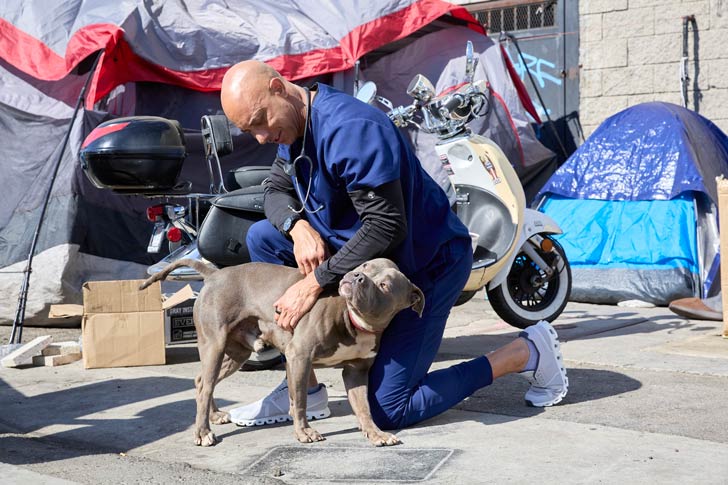
He is currently working on creating a string of veterinary clinics specifically offering lower-cost, essential care, instead of “gold-standard” clinics that offer patients more than they need to turn a profit.
“They’re bottlenecking everything when a pet comes in and they try to cover everything at once, instead of just treating the ear infection or whatever they came in with,” Stewart said.
“That’s not serving people. My clinics aim to address that problem: Giving essential care in the moment at a cost that most people could probably afford.”
While Stewart attempts to change things from the streets and the exam rooms, other animal advocates hope that dog lovers of all kinds will stand up for a future that serves people and pets alike.
Klee, the 25-time dog foster mom, used the New York City mayoral primary in June 2025 to encourage viewers to engage in elections and call for legislative solutions to the problems that land people in these tough situations in the first place.
“The animal welfare crisis is happening because of a human welfare crisis. I know it can feel hopeless, especially in this political climate, but I think it’s in this hopelessness that we can push for change. This city is … turning into a place where only wealthy people can survive. It’s even turning into a place where only wealthy people can own pets,” Klee said in a social media video.
“I’m calling on you to pay attention and to give a shit.”
A version of this article was originally published in The 2025 Dogs Edition of the Goodnewspaper.
Header image by Carra Sykes for Good Good Good
